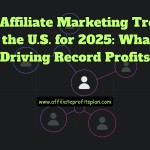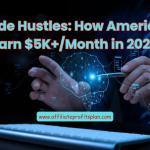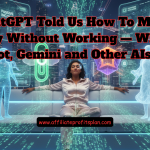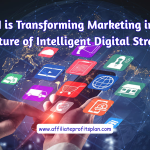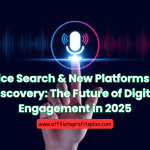Welcome to my article “How AI Is Transforming Marketing in 2025”
The marketing world is evolving at lightning speed — and Artificial Intelligence (AI) is at the heart of this revolution. From predictive analytics to hyper-personalized campaigns, AI has transformed how brands connect, engage, and convert audiences. In 2025, marketing is no longer about intuition alone — it’s about intelligent decision-making backed by data, automation, and creativity enhanced by machines. The rise of artificial intelligence is not only revolutionizing how marketers work but also how people earn online. Learn more in How to Make Money with AI for Beginners.
AI is not replacing marketers; it’s empowering them to achieve more. With advanced algorithms and deep learning models, marketers can now understand customer behavior like never before, predict future trends, and deliver precisely targeted content at the right time. Whether you’re running a small online business or managing a global brand, the integration of AI tools in marketing strategies has become essential for survival and growth.
This article explores how AI is transforming marketing in 2025, uncovering the most powerful trends, tools, and techniques that define the new era of intelligent marketing. Let’s dive deep into the ways AI is reshaping creativity, strategy, and customer experience — and why embracing this shift could be the smartest move for any modern marketer.
Access Our Proven Tested Formula for $50-$100 Daily Income – Watch This FREE Video >>
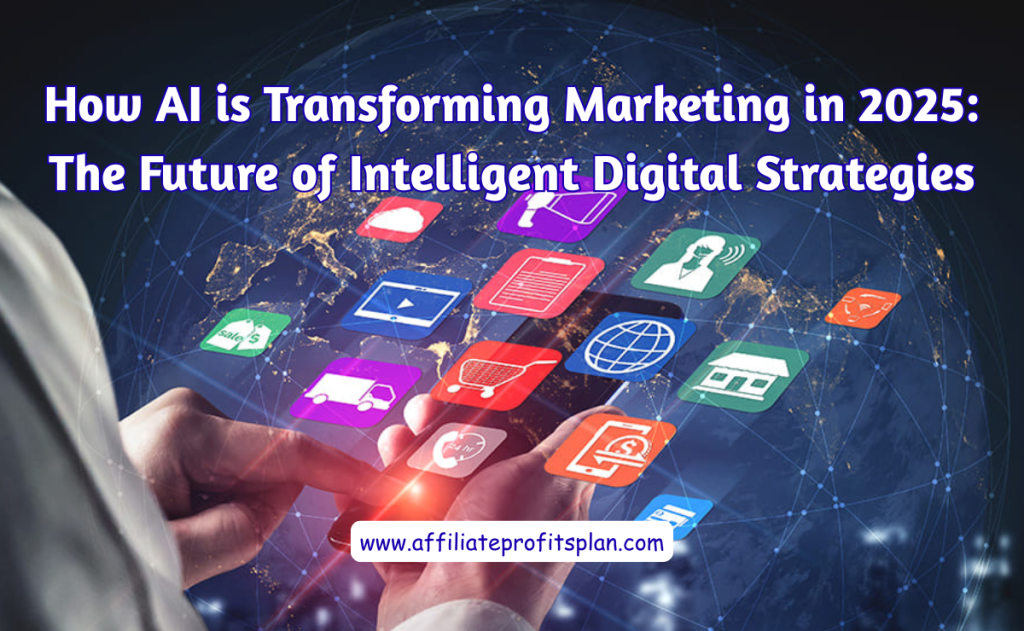
1. How AI Is Transforming Marketing Through Personalization
How AI Is Transforming Marketing with Hyper-Personalized Experiences
The marketing world is evolving fast — and How AI Is Transforming Marketing in 2025 is one of the most exciting revolutions yet. From predictive analytics to personalization, AI is reshaping how brands connect with audiences across every digital channel. Personalization has always been the holy grail of marketing. But with AI, personalization has evolved far beyond using someone’s first name in an email. Today, AI analyzes massive amounts of data — purchase history, browsing behavior, demographics, and even sentiment — to deliver tailored experiences in real-time. AI-driven personalization is key to digital success. For a deeper dive into optimizing conversion rates, check out How to Maximize Affiliate Commissions with High-Converting Landing Pages.
According to a McKinsey & Company report, companies leveraging AI personalization see revenue growth rates of up to 20%. Marketers can now predict what customers want before they even express it. AI-driven personalization engines such as Dynamic Yield or Adobe Sensei enable businesses to display personalized product recommendations, adjust pricing dynamically, and craft individualized messages that resonate deeply with each user.
The result? Higher engagement, stronger customer loyalty, and a noticeable boost in conversion rates. According to McKinsey, companies leveraging AI personalization see revenue growth rates of up to 20%. This level of intelligence allows marketers to focus on creativity while AI handles the heavy lifting of data analysis.
In 2025, personalization powered by AI isn’t just an advantage — it’s an expectation. Customers crave experiences that feel intuitive and authentic. Brands that can harness AI to meet those expectations will dominate the marketplace.
2. Predictive Analytics: How AI Is Changing Marketing Strategies
How AI Is Transforming Marketing Decisions Through Predictive Insights
AI-driven predictive analytics enables marketers to move from reactive to proactive decision-making. By analyzing historical and real-time data, AI algorithms can forecast trends, buying intent, and even potential churn rates.
For example, predictive models in CRM systems like Salesforce Einstein or HubSpot AI can alert marketers when a customer is likely to make a purchase — or when they’re about to leave. This allows brands to intervene with the perfect offer or personalized message at the right moment.
Predictive analytics also improves advertising efficiency. By predicting which audiences are most likely to convert, AI helps businesses reduce wasted ad spend and focus budgets on high-intent users. It’s marketing that’s not just smart — it’s anticipatory.
As AI models continue to learn from global consumer behavior, predictive analytics will become an indispensable part of campaign strategy. The future belongs to brands that can see around the corner — and act on insights faster than their competitors.
3. Chatbots and Conversational AI in Modern Marketing
How AI Is Transforming Marketing Communication Through Chatbots
The way customers communicate with brands has drastically changed. AI-powered chatbots and conversational agents now manage millions of customer interactions daily — instantly, accurately, and with empathy.
These intelligent bots go far beyond basic scripts. Using Natural Language Processing (NLP), they can understand tone, intent, and context to deliver human-like responses. Tools like ChatGPT, Drift, and Intercom are setting new standards for conversational marketing.
Access Our Proven Tested Formula for $50-$100 Daily Income – Watch This FREE Video >>
For businesses, the advantages are undeniable — faster response times, reduced operational costs, and consistent customer experiences. Consumers appreciate having 24/7 access to assistance without waiting in queues.
Moreover, conversational AI is becoming a data goldmine. Every interaction teaches systems more about user preferences, allowing brands to fine-tune products and marketing messages with remarkable precision.
4. AI in Content Creation and Optimization for Marketers
How AI Is Transforming Marketing Content with Smart Automation
AI is revolutionizing content marketing by blending creativity with data-driven intelligence. Advanced tools like Jasper, Copy.ai, and ChatGPT assist marketers in brainstorming ideas, generating copy, and optimizing SEO strategies in seconds.
Want to use AI to create content that ranks? Read The Power of SEO in Affiliate Marketing: Strategies for More Traffic.
AI doesn’t replace human creativity — it amplifies it. By analyzing engagement metrics, keyword performance, and user feedback, AI systems can suggest what topics, tones, and visuals perform best with specific audiences.
Marketers can now create hyper-targeted blogs, videos, and social media content that drive engagement and conversions at scale. In addition, AI helps repurpose content efficiently — turning one long article into multiple short-form posts, captions, or video scripts.
The future of marketing content lies in synergy: humans provide emotional intelligence and storytelling; AI provides precision, data, and scalability. Together, they produce content that resonates — and ranks.
5. How AI Is Revolutionizing Marketing with Programmatic Advertising
How AI Is Transforming Marketing Campaigns via Programmatic Ads
AI has completely transformed digital advertising through programmatic ad buying, where machine learning automates ad placements in real time. Instead of manual bidding, AI decides which ads to show, to whom, and at what price — all within milliseconds. Automation extends far beyond ads — explore more in How to Automate Your Affiliate Marketing Business.
Platforms like Google Ads AI and The Trade Desk use AI to analyze millions of data points — location, device, time of day, and user intent — to deliver ads that convert. This precision leads to less wasted ad spend and higher ROI.
Marketers can now fine-tune campaigns dynamically. AI continually tests and adjusts creatives, copy, and placement strategies for optimal performance.
In 2025, programmatic advertising isn’t just about automation — it’s about intelligent optimization. The combination of AI and machine learning ensures every ad dollar is used effectively, making marketing budgets work smarter than ever.
6. Visual Marketing Transformation with AI and Video Intelligence
How AI Is Transforming Marketing through Visual and Video Intelligence
AI’s ability to analyze images and videos has redefined visual marketing. Through computer vision, AI can detect objects, emotions, and even brand logos within visual content, providing insights that were once impossible to gather manually.
Marketers use AI-powered tools to understand which visuals drive the most engagement. Video analytics platforms now measure emotional reactions, audience attention span, and brand recall in real-time.
Furthermore, AI is helping create personalized video content at scale. With platforms like Synthesia or Pictory, marketers can produce customized video ads using AI-generated presenters and voices — saving both time and budget.
In 2025, video remains the most powerful medium online, and AI ensures that it’s not only visually stunning but also strategically optimized for performance and connection.
7. Ethical AI in Marketing: Building Trust in a Digital Age
How AI Is Transforming Marketing Ethics and Consumer Trust
As AI becomes central to marketing, ethical responsibility becomes critical. Consumers are more aware of data privacy, transparency, and algorithmic bias than ever. Marketers must ensure that AI is used ethically — protecting user data and maintaining trust.
Regulatory frameworks like GDPR and upcoming AI governance laws emphasize fairness and accountability. Ethical AI isn’t just a compliance issue; it’s a brand value.
Responsible AI use isn’t optional — it’s essential for trust. See how transparency builds long-term relationships in The Psychology of Internet Marketing: How to Influence Online Buying Decisions.
Forward-thinking marketers are building human-centered AI strategies that emphasize empathy, inclusion, and transparency. When consumers know that AI is being used responsibly, it strengthens brand loyalty and credibility.
The future of marketing will belong to brands that combine technological brilliance with human values.
Conclusion
As we’ve seen throughout this guide, How AI Is Transforming Marketing in 2025 goes far beyond automation — it’s about creating smarter, more personalized, and data-driven customer experiences. Businesses that embrace this transformation now will lead the future of digital innovation. AI is not the future of marketing — it’s the present reality shaping every campaign, channel, and customer interaction. From predictive analytics to personalized content, AI empowers marketers to move faster, smarter, and more creatively than ever before.
The true power of AI lies in its partnership with human creativity. Machines can analyze and predict, but only humans can inspire, connect, and lead with emotion. The brands that master this balance will define the next era of digital marketing success.
Access Our Proven Tested Formula for $50-$100 Daily Income – Watch This FREE Video >>
Now is the time for marketers to embrace AI — not as a replacement, but as a revolutionary ally in shaping meaningful, intelligent customer experiences.
Thanks so much for reading my article on “How AI Is Transforming Marketing in 2025”. I hope you found it helpful. See you next time with more insights!
FAQs
1. How is AI changing the way marketers understand customers?
AI helps marketers analyze customer data in real time, revealing insights about behavior, preferences, and intent that guide smarter decision-making and personalization.
2. What are the best AI tools for marketing in 2025?
Some top tools include Jasper for content, HubSpot AI for CRM, ChatGPT for automation, and Google Ads AI for programmatic advertising.
3. Will AI replace human marketers?
No. AI automates repetitive tasks and enhances insights, but human creativity, emotion, and strategy remain irreplaceable.
4. How does AI improve ad targeting?
Through predictive modeling and real-time bidding, AI ensures ads reach the right audience at the right time, maximizing ROI.
5. What’s the future of AI in marketing?
AI will continue to enhance personalization, automate decision-making, and make marketing more data-driven, ethical, and emotionally intelligent.



